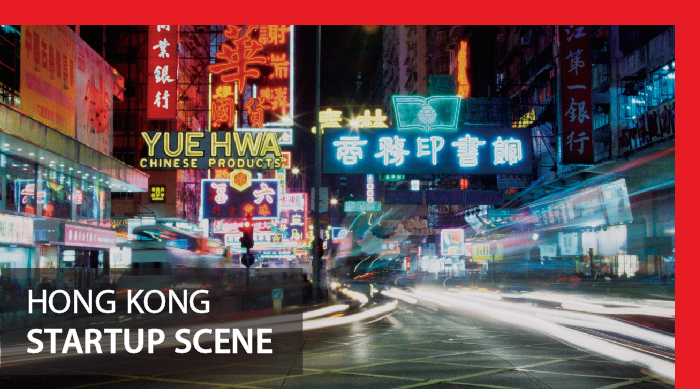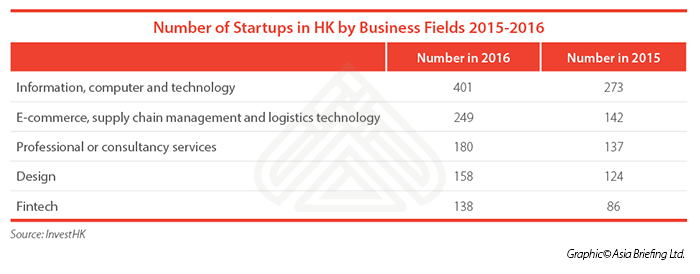Hong Kong’s Startup Scene: the Future of Mainland–Hong Kong Economic Cooperation
While Hong Kong’s startup ecosystem is relatively young, it has grown quickly in recent years. Many entrepreneurs are attracted by the city’s high rate of internet penetration, which has allowed for greater adoption of tech innovations. Additionally, the Hong Kong government has been aggressively promoting initiatives to expand entrepreneurship in the face of increased competition from southeast China.
However, Hong Kong’s proximity to Shenzhen, one of the key tech start-up hubs within mainland China, has added dynamic considerations to the Hong Kong startup environment, and this has multiple effects for multinationals and foreign investors.
In this article, we explore the rise of Hong Kong’s startup scene, and the multitude of factors that have contributed to its emergence. We also analyze what it augurs for the Mainland-Hong Kong relationship and how this will affect multinational companies.
The evolution of Hong Kong’s startup scene
According to the 2016 survey released by InvestHK, the investment promotion arm of Hong Kong, the number of startups in the city rose from 1,558 in 2015 to 1,926 in 2016, an increase of 24 percent. The main business fields for the surveyed startups are described immediately below.
Entrepreneurs are particularly interested in Fintech, which is associated with the city’s well-developed financial infrastructure and expertise, and the Internet of Things (IoT).
A survey by the Hong Kong Trade Development Council (HKTDC) found that most Hong Kong startups tend to be at later stages of development – 37 percent surveyed responded that they were at the market launch stage, and 28 percent said they were at the growth or expansion stage. Only 12 percent and 20 percent replied that they were at the concept development state and prototype or testing stage, respectively.
Additionally, the majority of Hong Kong startups, about 52 percent, focus on both business-to-business (B2B) and business-to-consumer (B2C) activities simultaneously. Their main market focus is Hong Kong – 87 percent listed the city as their major current market.
However, Asia and North America topped startups’ ambitions, with 56 percent listing the Chinese mainland, 49 percent listing Taiwan, 41 percent listing the Americas and Canada, followed by a close processions of Japan, Hong Kong, and ASEAN.
![]() RELATED: Pilot Tax Policies for Venture Capital Enterprises and Individual Investors in China
RELATED: Pilot Tax Policies for Venture Capital Enterprises and Individual Investors in China
Government initiatives
To galvanize the startup community, and attract attention, the government has released a series of initiatives focused on increasing available funding through venture capital funds, as well as funding for universities aimed at encouraging technology startups.
During the 2017 Policy Address, the government laid out their plans to continue support into startups, totaling six individual items that address startup applicability.
From the Address, the government laid out its initial plans to transform Hong Kong into a smart city, dedicating HK$500 million towards technology to improve public services and promoting the establishment of a Common Spatial Data Infrastructure (CSDI) to share geospatial data for public and private sector cooperation on different smart city applications.
Last year in 2016, the government expanded their scope and depth through a HK$2 billion Innovation and Technology Venture Fund. The Fund seeks to invest in local innovation with private venture capital matches.
Prior to this in 2014, the government-established Innovation and Technology Commission (ITC) rolled out the ’Technology Startup Support Scheme for Universities’ (TSSSU), which provided six universities HK$4 million (US$515,000) each in annual funding to support tech startups.
Integration into the Pearl River Delta
Another major announcement during the 2017 Policy Address was the Hong Kong and Shenzhen deal to jointly develop the Lok Ma Chau Loop into the Hong Kong-Shenzhen Innovation and Technology Park, a controversial decision amongst both parties.
The Park settles a land ownership dispute between Hong Kong and Shenzhen, but also raises questions regarding the integration of the two cities, the two rules of law and ecological concerns.
If successful, the Park will be a milestone for Hong Kong entrepreneurship; it will be the largest innovation and technology center in the city. Additionally, it signals a willingness on the part of Hong Kong to cooperate closer with the mainland and play to its advantage of closer access to the billions of mainland Chinese consumers.
Thus far, the relationship between the two cities has been more cooperative than competitive, with Hong Kong specializing in international access and talent, and Shenzhen specializing in manufacturing capabilities.
According to John Artman, Editor-in-Chief of Technode, “Shenzhen…has recently seen an explosion of startups, many based around hardware or cross border e-commerce, sales, localization. Shenzhen is well placed to take advantage of the proximity to Hong Kong for financing and imported goods while the city’s recent history as a manufacturing hub means that startups have access to a lot of expertise and equipment in this area.”
![]() RELATED: Corporate Establishment Services from Dezan Shira & Associates
RELATED: Corporate Establishment Services from Dezan Shira & Associates
Implications for foreign investors
The emergence of a vibrant startup culture and greater cooperation with mainland China are trends that has already had a major impact on Hong Kong’s economy and will continue to do so. This has a number of implications for foreign investors – both multinationals and SMEs alike.
The Hong Kong government provides startups with a number of support and fund initiatives, which should ensure their ability to flourish in the future, and to drive its plans to turn Hong Kong into a smart city.
By the very nature of it, startup culture will continue to disrupt traditional business models. Already, the hotel, taxi and automobile renting and bike industries have seen major changes (through AirBnB, Didi and Uber, and Mobike and Ofo, respectively). There is no reason to think that other traditional industries, such as banking, logistics and manufacturing will lay dormant for long.
Thankfully, traditional business models and startups can synergize well in each of the areas where they perform poorly. For example, multinationals and SMEs can benefit from the new technologies or resources developed at startups, as well as the talent groomed there. Likewise, startups can make the most of an orderly corporate structure and knowledge base developed at multinationals and SMEs to chart a steady path to growth.
“We are at a super interesting time for tech right now because more and more corporations realize that they need to either protect themselves from disruption or need to make sure they continue to grow,” Artman said. “There’s a lot of room for large corporates to take advantage of these trends either in finding innovative business models or just new services and products.”
|
China Briefing is published by Asia Briefing, a subsidiary of Dezan Shira & Associates. We produce material for foreign investors throughout Asia, including ASEAN, India, Indonesia, Russia, the Silk Road, and Vietnam. For editorial matters please contact us here, and for a complimentary subscription to our products, please click here. Dezan Shira & Associates is a full service practice in China, providing business intelligence, due diligence, legal, tax, IT, HR, payroll, and advisory services throughout the China and Asian region. For assistance with China business issues or investments into China, please contact us at china@dezshira.com or visit us at www.dezshira.com
|

Dezan Shira & Associates Brochure
Dezan Shira & Associates is a pan-Asia, multi-disciplinary professional services firm, providing legal, tax and operational advisory to international corporate investors. Operational throughout China, ASEAN and India, our mission is to guide foreign companies through Asia’s complex regulatory environment and assist them with all aspects of establishing, maintaining and growing their business operations in the region. This brochure provides an overview of the services and expertise Dezan Shira & Associates can provide.
An Introduction to Doing Business in China 2017
This Dezan Shira & Associates 2017 China guide provides a comprehensive background and details of all aspects of setting up and operating an American business in China, including due diligence and compliance issues, IP protection, corporate establishment options, calculating tax liabilities, as well as discussing on-going operational issues such as managing bookkeeping, accounts, banking, HR, Payroll, annual license renewals, audit, FCPA compliance and consolidation with US standards and Head Office reporting.
In this issue of China Briefing magazine, we provide foreign investors with best practices for implementing internal controls in China. We explain what makes China’s internal control environment distinct, and why China-based operations need to prioritize internal control. We then outline how to execute an internal control review to gauge organizational resiliency and identify gaps in control points, and introduce practical internal controls for day-to-day operations. Finally, we explore why ERP systems are becoming increasingly integral to companies’ internal control regimes.
- Previous Article AI in China: How AI Can Optimize Your Operations
- Next Article China’s Five-in-One Business License: Pressure Mounts for Foreign Businesses to Implement














